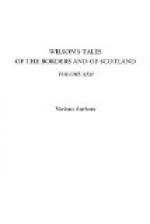man as ye could see; indeed I took him to be a particular
serious and honest man. So there was ae night
that I was rather mair than ordinary hearty, and says
he to me: ‘Mr Stuart,’ says he, ’will
you lend your name to a bit paper for me?’ ‘No,
I thank ye, sir,’ says I; ‘I never wish
to be caution for onybody.’ ‘It’s
of no consequence,’ said he, and there was no
more passed. But as I was rising to gang hame,
‘Come, tak’ anither, Mr. Stuart,’
said he; ‘I’m next the wa’ wi’
ye—I’ll stand treat.’ Wi’
sair pressing I was prevailed upon to sit doun again,
and we had anither and anither, till I was perfectly
insensible. What took place, or how I got hame,
I couldna tell, and the only thing I remember was
a head fit to split the next day, and Jeannie very
ill pleased and powty-ways. However, I thought
nae mair about it, and I was extremely glad I had
refused to be bond for the person who asked me; for
within three months I learned that he had broken and
absconded wi’ a vast o’ siller. It
was just a day or twa after I had heard the intelligence,
I was telling Jeannie and her mother o’ the
circumstance, and what an escape I had had, when the
servant lassie showed a bank clerk into the room.
‘Tak’ a seat, sir,’ said I, for I
had dealings wi’ the bank. ‘This
is a bad business, Mr. Stuart,’ said he.
‘What business?’ said I, quite astonished.
’Your being security for Mr. So-and-so,’
said he. ‘Me!’ cried I, starting up
in the middle o’ the floor—’Me!—the
scoundrel—I denied him point blank!’
’There is your own signature for a thousand
pounds,’ said the clerk. ’A thousand
furies!’ exclaimed I, stamping my foot; ’it’s
a forgery—an infernal forgery!’ ‘Mr.
Such-a-one is witness to your handwriting,’ said
the clerk. I was petrified; I could hae drawn
down the roof o’ the house upon my head to bury
me! In a moment a confused recollection o’
the proceedings at Luckie Macnaughton’s flashed
across my memory, like a flame from the bottomless
pit! There was a look o’ witherin’
reproach in my mother-in-law’s een, and I heard
her mutterin’ between her teeth, ’I aye
said what his three tumblers wad come to.’
But my dear Jeannie bore it like a Christian, as she
is. She cam forward to me, an’, poor thing,
she kissed my cheek, and says she, ‘Dinna distress
yoursel’, David, dear—it cannot be
helped now—let us pray that this may be
a lesson for the future.’ I flung my arm
round her neck—I couldna speak; but at last
I said, ’Oh Jeannie, it will be a lesson, and
your affection will be a lesson!’ Some o’
your book-learned folk wad ca’ this conduct philosophy
in Jeannie; but I, wha kenned every thought in her
heart, was aware that it proceeded from her resignation
as a true Christian, and her affection as a dutiful
wife. Weel, the upshot was, I had robbed mysel’
out o’ a thousand pounds as simply as ye wad
snuff out a candle. You have heard the saying,
that sorrow ne’er comes singly; and I am sure,
in a’ my experience, I have found its truth.
At that period I had two thousand pounds, bearing




